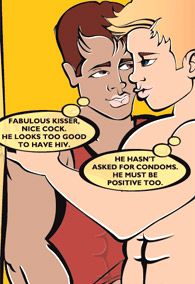New HIV infections are rising throughout Australia, with experts pointing to worrying trends in the nation's three most populous states and calling for a revamp of Australia's response to the disease, reports the Australian Associated Press.

Part of a poster from ACON's "Expose the Myths" campaign which comprises of a series of nine posters distributed throughout the year, each exploring some of the "Myths" that still prevail around issues of unprotected sex, HIV transmission and current treatments.
More than 700 Australians, mostly gay and bisexual men, became infected with HIV last year.
Matt Gillett, General Manager of the Queensland AIDS Council said gay and bisexual men were still the highest risk group with an increasing trend of unprotected sex in Australia.
He told The Courier Mail that research had shown a slight increase in the number of infections from gay men coming in contact with people from high-risk countries, both in Australia and overseas, and heterosexual people coming in contact with people from high-risk countries.
Adrian Lovney, the president of the AIDS Council of NSW, said the rise in HIV infection rates could be attributable to changes in sexual practices amongst gay men, including a decline of condom use.
For some reason Victoria began this trend," said Bill Whittaker, the president of the Australian Federation of AIDS Organisations. "Now we've got two other states showing similar figures."
Whittaker blames a rise in infections in Victoria, NSW and Queensland on declining Federal Government funding and leadership, increased levels of unprotected sex spurred by a growing sense that HIV antiretroviral drugs have turned AIDS from a death sentence into a manageable chronic illness.
"These states make up almost 90% of the national HIV/AIDS caseload, so it's pretty hard to escape the fact that we've got a trend going on here."
He noted that infection rates declined in 1990s and plateaued from 1995-96, remaining steady because of an internationally recognised prevention effort. He warned: "We need to act now - if we don't we will almost certainly pay for it in the future."
